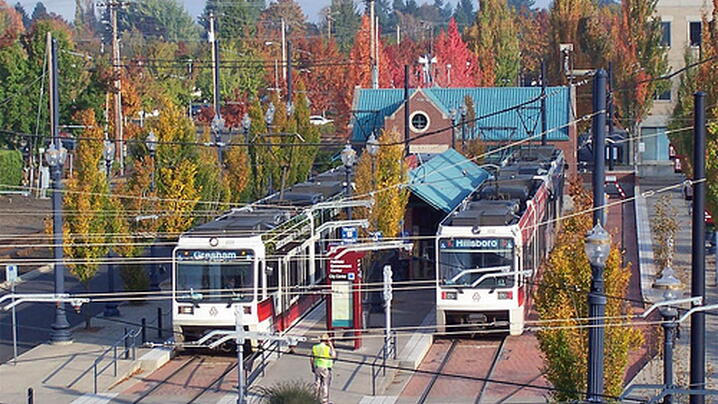
The US Department of Housing and Urban Development and the Environmental Protection Agency recently announced a grant program, Capacity Building for Sustainable Communities, in support of eco -friendly, transit-oriented communities. Through the Partnership for Sustainable Communities formed in 2009, HUD, EPA, and the Department of Transportation have worked together to provide affordable housing and transportation choice while protecting the environment in communities nationwide. This new grant program will help these communities exchange knowledge and build capacity as they work to meet sustainability goals.
Triple Pundit points out that although the program funding is only $5.6 million, its goals are ambitious in linking the many aspects of sustainability. For example, urbanists like Richard Florida point out that providing transportation choice has a big economic impact, since “transit-friendly communities can make a big financial difference for families.” In fact, a study by Oregon’s Livable Communities Task Force shows that living in a typical car-dependent community can cause a significant financial drain on family budgets, and a transit option can offer as much as 16% savings in disposable income. This link between housing and transportation is one reason that sustainability programs require the coordination of several players.
The HUD and EPA grant program aims to provide an opportunity for grantees to network and exchange knowledge on sustainable building and best practices. The Triple Pundit article also credits the private sector, non-profits, and local governments as the leaders in the sustainability. Places like Portland, Oregon and Arlington, Virginia have demonstrated foresight and emphasized transit access for more than 40 years. Proponents also suggest that affordable housing be included in planning sustainable communities. Organizations like the Gulf Coast Community Design Studio and Earthships provide good examples of bringing eco -friendly designing to medium- and low-income communities.
Building sustainable communities is at the heart of ICMA’s mission, and our Center for Sustainable Communities has led a wide range of work on sustainability issues at the local level. The Knowledge Network is also already serving as a platform for communities of all sizes to share best practices in housing, transportation, and the environment. Some of these Knowledge Network resources include:
-The 2010 ICMA Community Sustainability Award winner was City of the Sun, Heerhugowaard, The Netherlands where a new housing development was created combining solar energy and sustainable water systems.
- The Germantown Smart Growth Partnership Program was also nominated for a 2010 Community Sustainability Award. Its “Meeting the Triple Bottom Line” program helps city officials evaluate development projects on smart growth principals while keeping the goals of environmental stewardship, community building and financial sustainability intact. Qualifying projects receive financial incentive packages.
- A summary of other 2010 Community Sustainability Award nominees showcases the range of initiatives local governments are taking across the country to balance their community’s social, economic, environmental, and cultural needs.
- Complete the Streets for Smart Growth, documents the efforts of various communities as they apply smart growth transit principals to their neighborhoods, creating inclusive streets for all.
- Expanding Housing Opportunities Near Transit, a report outlining the challenges of creating affordable housing near public transit and the ways that cities and towns like Boston, Charlotte, Denver, Minneapolis-St Paul and Portland are meeting that challenge.
- The ICMA report, Putting Smart Growth to Work in Rural Communities offers smart growth strategies specifically geared to rural areas, including investment in downtowns and existing infrastructure, conservation of natural resources, and creating vibrant communities.
New, Reduced Membership Dues
A new, reduced dues rate is available for CAOs/ACAOs, along with additional discounts for those in smaller communities, has been implemented. Learn more and be sure to join or renew today!
